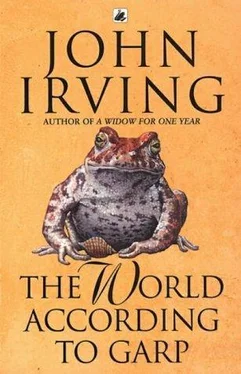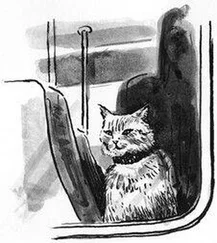One of them was Harrison Fletcher; his field was the Victorian Novel, but Helen liked him for other reasons—among them: he was also married to a writer. Her name was Alice; she was also working on her second novel, although she'd never finished her first. When the Garps met her, they thought she could easily be mistaken for an Ellen Jamesian—she simply didn't talk. Harrison, whom Garp called Harry, had never been called Harry before—but he liked Garp and he appeared to enjoy his new name as if it were a present Garp had given him. Helen would continue to call him Harrison, but to Garp he was Harry Fletcher. He was Garp's first friend, though Garp and Harrison both sensed that Harrison preferred Helen's company.
Neither Helen nor Garp knew what to make of Quiet Alice, as they called her. “She must be writing one hell of a book,” Garp often said. “It's taken all her words away.”
The Fletchers had one child, a daughter whose age put her awkwardly between Duncan and Walt: it was implied that they wanted another. But the book, Alice's second novel, came first; when it was over, they would have a second child, they said.
The couples had dinner together occasionally, but the Fletchers were strictly cook-out people—which is to say, neither of them cooked—and Garp was in a period where he baked his own bread, he had a stockpot always simmering on the stove. Mostly, Helen and Harrison discussed books, teaching, and their colleagues, they ate lunch together at the university union, they conversed—at length—in the evening, on the phone. And Garp and Harry went to the football games, the basketball games, and the wrestling meets; three times a week they played squash, which was Harry's game—his only sport—but Garp could play even with him simply because Garp was a better athlete, in better shape from all his running. For the pleasure of these games, Garp suppressed his dislike of balls.
In the second year of this friendship, Harry told Garp that Alice liked to go to movies. “I don't ,” Harry admitted, “but if you do—and Helen said that you did—why not take Alice?”
Alice Fletcher giggled at movies, especially serious movies, she shook her head in disbelief at almost every thing she saw. It took months for Garp to realize that Alice had something of an impediment or a nervous defect in her speech; perhaps it was psychological. At first Garp thought it was the popcorn.
“You have a speech problem, I think, Alice,” he said, driving her home one night.
“Yeth,” she said, nodding her head. Often it was a simple lisp; sometimes it was completely different. Occasionally, it wasn't there. Excitement seemed to aggravate it.
“How's the book coming?” he asked her.
“Good,” she said. At one movie she had blurted out that she'd liked Procrastination .
“Do you want me to read any of your work?” Garp asked her.
“Yeth,” she said, her small head bobbing. She sat with her short, strong fingers crushing her skirt in her lap, the way Garp had seen her daughter crinkle her clothes—the child would sometimes roll her skirt, like a window shade, right up above her panties (though Alice stopped short of this).
“Was it an accident?” Garp asked her. “Your speech problem. Or were you born with it?”
“Born with,” Alice said. The car stopped at the Fletchers' house and Alice tugged Garp's arm. She opened her mouth and pointed inside, as if this would explain everything. Garp saw the rows of small, perfect teeth and a tongue that was fat and fresh-looking like the tongue of a child. He could see nothing peculiar, but it was dark in the car, and he wouldn't have known what was peculiar if he'd seen it. When Alice closed her mouth, he saw she was crying—and also smiling, as if this act of self-exposure had required enormous trust. Garp nodded his head as if he understood everything.
“I see,” he mumbled. She wiped her tears with the back of one hand, squeezed his hand with her other.
“Harrithon is having an affair,” she said.
Garp knew that Harry wasn't having an affair with Helen, but he didn't know what poor Alice thought.
“Not with Helen,” Garp said.
“Na, na,” Alice said, shaking her head. “Thumone elth .”
“Who?” Garp asked.
“A thtudent!” Alice wailed. “A thtupid little twat!”
It had been a couple of years since Garp had molested Little Squab Bones, but in that time he had indulged himself in one other baby-sitter; to his shame, he had even forgotten her name. He felt, honestly, that baby-sitters were an appetite he was forever through with. Yet he sympathized with Harry—Harry was his friend, and he was an important friend to Helen. He also sympathized with Alice. Alice was alertly lovable; a kind of terminal vulnerability was clearly a part of her, and she wore it as visibly as a too-tight sweater on her compact body.
“I'm sorry,” Garp said. “Can I do anything?”
“Tell him to thtop ,” Alice said.
It had never been hard for Garp to stop, but he had never been a teacher—with “thtudents” on his mind, or on his hands. Perhaps what Harry was involved with was something else. The only thing Garp could think of—that would perhaps make Alice feel better—was to confess his own mistakes.
“It happens, Alice,” he said.
“Not to you,” Alice said.
“Twice to me,” Garp said. She looked at him, shocked.
“Tell the truth ,” she insisted.
“The truth,” he said, “is that it happened twice. A baby-sitter, both times.”
“Jesuth Chritht,” said Alice.
“But they weren't important,” Garp said. “I love Helen.”
“ Thith is important,” Alice said. “He hurth me. And I can't white .”
Garp knew about writers who couldn't white ; this made Garp love Alice, on the spot.
“Fucking Harry is having an affair,” Garp told Helen.
“I know,” Helen said. “I've told him to stop, but he keeps going back for more. She's not even a very good student.”
“What can we do?” Garp asked her.
“Fucking lust ,” Helen said. “Your mother was right. It is a man's problem. You talk to him.”
“Alice told me about your baby-sitters,” Harry told Garp. “It's not the same. This is a special girl.”
“A student , Harry,” Garp said. “Jesus Christ.”
“A special student,” Harry said. “I'm not like you. I've been honest, I've told Alice from the first. She's just got to accommodate it. I've told her she's free to do this, too.”
“She doesn't know any students,” Garp said.
“She knows you ,” Harry told him. “And she's in love with you.”
“What can we do?” Garp asked Helen. “He's trying to set me up with Alice so he'll feel better about what he's doing.”
“At least he's been honest with her,” Helen told Garp. There was one of those silences wherein a family can identify its separate, breathing parts in the night. Open doors off an upstairs hall: Duncan breathing lazily, an almost-eight-year-old with lots of time to live; Walt breathing those tentative two-year-old breaths, short and excited; Helen, even and cool. Garp held his breath. He knew she knew about the baby-sitters.
“Harry told you?” he asked.
“You might have told me before you told Alice,” Helen said. “Who was the second one?”
“I forget her name,” Garp admitted.
“I think it's shabby,” Helen said. “It's really beneath me; it's beneath you . I hope you've outgrown it.”
“Yes, I have,” Garp said. He meant he had outgrown baby-sitters. But lust itself? Ah, well. Jenny Fields had fingered a problem at the heart of her son's heart.
“We've got to help the Fletchers,” Helen said. “We're too fond of them to do nothing about this.”
Читать дальше












